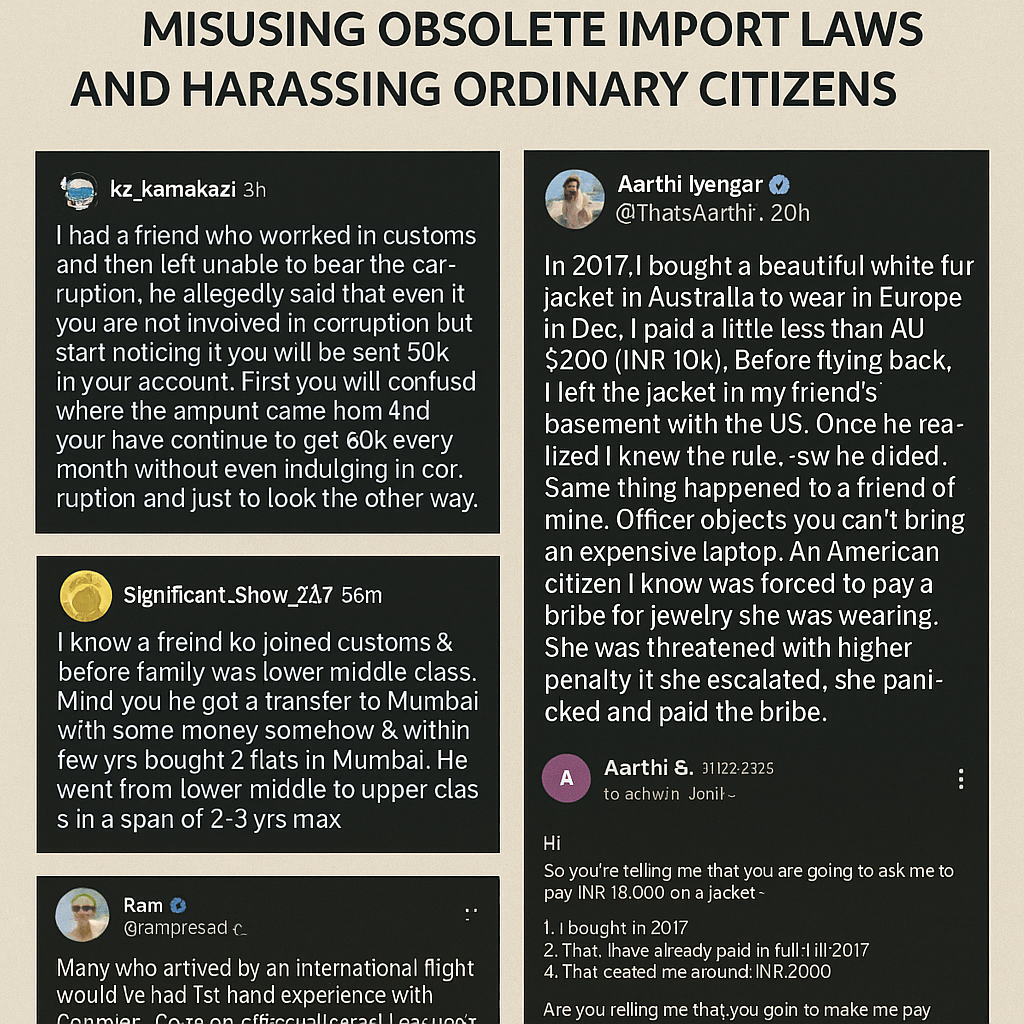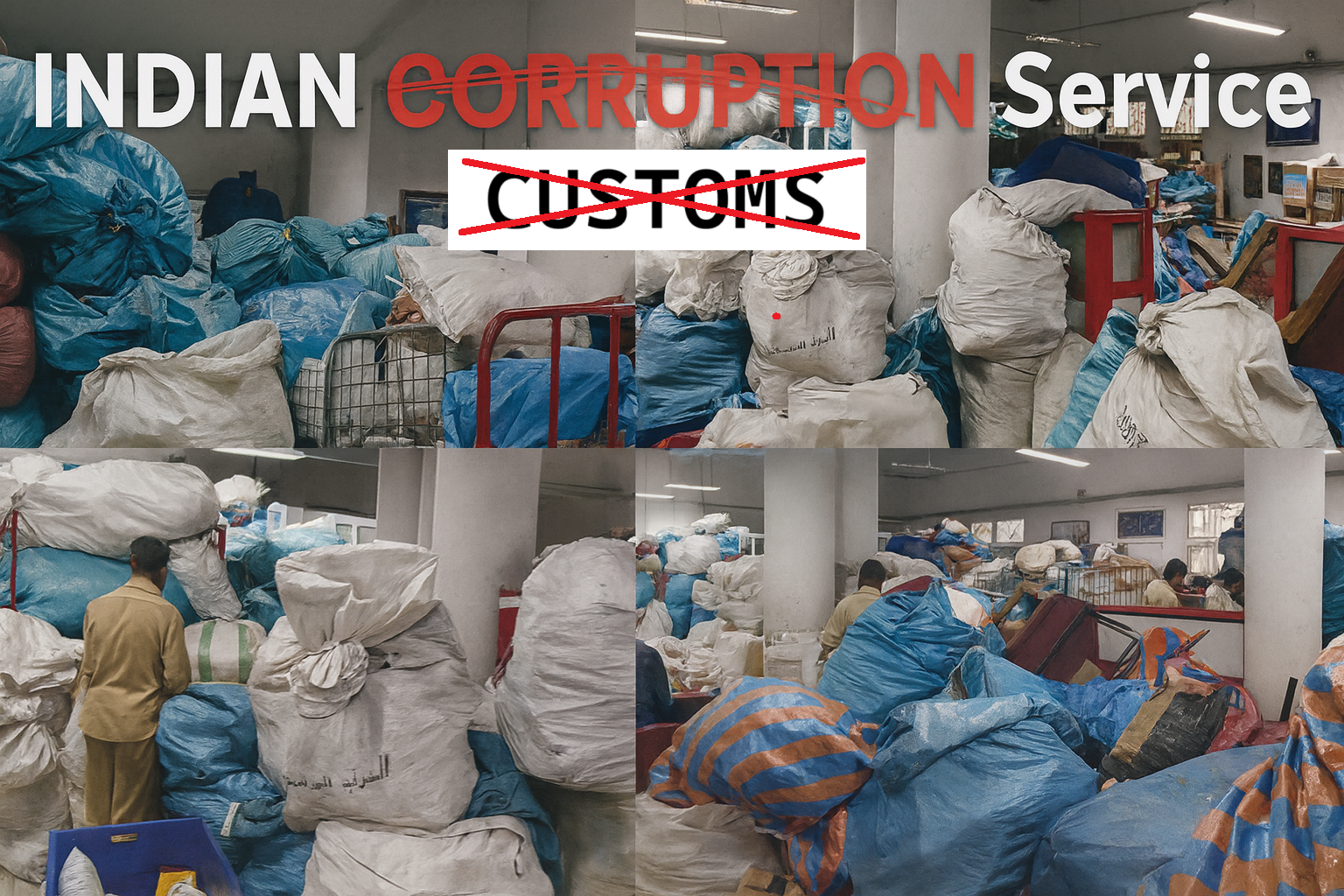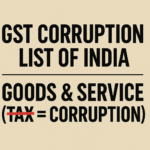Corruption at the Checkpoint: Why Chennai Customs — and Indian Customs Generally — are in the Viral Crosshairs
A storm has erupted online and in the press after Chennai-based importer Wintrack Inc. publicly accused Chennai Customs of repeated bribe demands, harassment and retaliatory tactics, prompting the company to suspend operations in India and forcing the Finance Ministry to order a probe. The controversy has reignited a decades-long debate about discretionary power at customs, weak accountability, and the human cost borne by ordinary importers and travellers.
Below I summarize the verified incidents, explain why the problem keeps recurring, and outline what an overhaul would need to look like.
Snapshot: What went viral — the Wintrack row (the spark)
- Wintrack Inc. (a Chennai trading/logistics firm) posted detailed allegations on social media claiming 45 days of harassment, repeated demands for money and inconsistent detention of shipments after the firm exposed alleged bribery. The firm said it will halt imports and exports in India as a result. Chennai Customs has denied the bribery claims and called the matter a technical compliance / misdeclaration issue; the Finance Ministry has deputed a senior revenue official to investigate.
Video – Click Here - Multiple mainstream outlets and regional newspapers picked the story up; videos and first-hand accounts circulated showing crew or staff members alleging on-camera impropriety by customs staff — amplifying public outrage.
List of Reported Corruption Cases & Public Experiences with Indian Customs – Click Here
1. Whistleblower Account from Inside Customs
- A Reddit user shared an account from a former customs officer who quit due to rampant corruption.
- Even honest officers allegedly receive Rs 50,000 per month “credits” in their bank accounts from unknown sources, forcing their complicity.
- If they protest or report, they are threatened with internal investigation for the same funds.
- “Those who are business-minded can make as much as they want,” the whistleblower noted — implying an institutionalized payoff system.
2. Business Owner’s Experience with Corruption (Reddit – “sonashine9”)
- A businessperson shared that bribes were routinely demanded even when paperwork was in perfect order.
- Some shipments were inspected unnecessarily, and certain products were allegedly taken as “gifts”.
- The user expressed relief that Customs is finally being called out, but noted that only large companies can afford to resist, while small traders must comply.
3. Observations About Rapid Wealth Growth Among Customs Staff
- Another Reddit comment alleged that a customs employee moved from lower-middle-class to upper-class within 2–3 years.
- The officer, after a transfer to Mumbai, reportedly bought two flats in that period — suggesting unexplained income growth.
4. Corporate Hesitation to Enter India (Reddit – “GreatlyUnimportant”)
- A global professional claimed that multinational companies avoid entering India directly due to fear of corruption and unethical practices, despite having strong corporate compliance values.
- The sentiment reflects how corruption is hurting India’s global business reputation.
5. “Daylight Robbery” Over a ₹7,500 Watch
- A traveller importing a Rs 7,500 wristwatch alleged that Customs officials demanded a Rs 10,000 bribe for its release, even after he presented valid proof of purchase. Despite multiple visits to the Customs office, officials reportedly refused to clear the item, forcing the buyer to abandon the watch altogether.
- Even after showing proof of purchase, officials refused to release it; after 2–3 visits, the importer abandoned the item.
- The case went viral as an example of petty extortion disguised as procedure.
- Customs Bribe Allegation Over Rs 7,500 Watch – Click Here
- The case has gone viral online as an example of petty corruption and harassment at Indian Customs, with many calling it “daylight robbery by government officials.”
6. Medical Glasses Charged as Luxury Sunglasses (Twitter – “DefenceBrat”)
- An individual suffering from sarcoidosis imported NoIR medical glasses (Rs 18,000) necessary to function outdoors.
- Customs charged Rs 5,000 duty, dismissing medical necessity and treating them as luxury sunglasses.
- Despite clear medical proof, the importer was forced to pay — showing insensitivity and poor discretion by Customs.
7. Seized & “Burnt” Personal Jacket (Twitter – “Aarthi Iyengar”)
- A woman shipped her own 6-year-old used jacket from abroad (Rs 7,000 original price) back to India.
- Customs demanded Rs 7,000 duty, even after she presented receipts proving it was personal property.
- Officials allegedly threatened to burn the jacket if unpaid — and later, the jacket disappeared.
- The story went viral as an example of vindictive and irrational Customs conduct.
8. Email Exchange Proving Harassment (Aarthi S. to Chennai Customs, 2023)
- The same woman shared her email correspondence, questioning a Rs 15,000 demand on a jacket already owned and used for 7 years.
- Her message highlighted the lack of common sense and empathy in Customs enforcement and the misuse of rules against regular taxpayers.
9. Passenger Bribe & Harassment Story (Twitter – “Ram Prasad”)
- A frequent flyer described how officers falsely claimed he couldn’t bring a new laptop, despite the law allowing it.
- When he cited the rule, the officer backed down — but others weren’t as lucky.
- A foreign traveler was threatened with heavier penalties over jewelry until she paid a bribe.
- He labeled Customs officers as “vultures,” noting even petty harassment like marking luggage with chalk “X” for unnecessary checks.
10. FedEx Shipment Exposes Broken Customs System in India – Click Here
A sender from Chicago shipped 60 signed legal A4 documents to New Delhi via FedEx for about $50, only to face a Rs 4,200 + GST “customs duty” on papers with zero commercial value.
Customs officials issued an ultimatum — pay within 24 hours or the shipment would be destroyed, with no appeal or response to calls and emails. The sender’s father eventually paid to retrieve the documents, describing it as an “official bribe.”
11. Customs Harassment Forces Foreign Manufacturers to Stop Shipping to India – Click Here
An Indian buyer reported paying ₹11,000 in customs charges to release a shipment worth only $140 (≈ Rs 12,000) for small industrial equipment.
The incident highlights excessive and arbitrary customs duties, described as “paisa vasool policies.” The foreign manufacturer has since stopped shipping directly to India, citing frequent harassment and unpredictable costs, forcing companies to write such losses off as business expenses.
12. Ego-Driven Harassment by Customs Assistant Commissioner at Bengaluru Air Cargo Complex
An executive of an MNC operating in India shared his ordeal with a Customs Assistant Commissioner (AC) at the Bengaluru Air Cargo Complex, where a shipment was held up over a minor query.
Despite the issue being routine, the AC insisted on a personal meeting with the company’s head, forcing the executive to appear in person. Upon arrival, he was made to wait 45 minutes as a deliberate show of power.
During the meeting, the officer accused multinational companies of “cheating India” and “avoiding duties,” dismissing the executive’s clarifications about standardized HS codes and compliance. The officer reportedly said, “I wanted to see you to show who controls your goods once it enters the country.”
As a result, the company’s appeal was later rejected, and they were forced to pay higher duty and Rs 1.5 lakh in demurrage, reflecting a culture of ego, corruption, and bureaucratic arrogance that punishes compliant businesses.
13. How Bureaucratic Corruption in Indian Customs Cost a Citizen His Shipment – Click Here
In 2019, you lost a small imported parcel after refusing to pay a bribe demanded by Customs officials at the Bengaluru Air Cargo Complex (BIAL).
The email trail shows how the Joint Commissioner of Customs refused to clear your shipment under courier mode and demanded conversion to cargo — a move designed to complicate the process and pressure you into paying.
The re-export or clearance process required multiple unnecessary documents — letters from importer and supplier, penalty acceptance, adjudication letter — and approval from four different customs officers (Assistant, Deputy, Joint, and Commissioner), creating a bureaucratic maze.
Officials insisted that DHL “could not push regulatory officers” since they are government officials, effectively stonewalling the process. Without a bribe, your shipment was delayed indefinitely and eventually lost.
This incident exposes how India’s customs system weaponizes procedures to extract money from citizens, discouraging honest importers. Your refusal to bribe made you a victim of a deeply entrenched culture of extortion and arrogance, ultimately forcing you to stop importing altogether.
The ordeal highlights how India’s customs bureaucracy penalizes even non-commercial, essential paperwork, raising questions about arbitrary charges, lack of transparency, and systemic inefficiency that ordinary citizens and small businesses face daily.
Notable recent and historical instances (representative, not exhaustive)
- Wintrack Inc. vs Chennai Customs — October 2025 (viral)
Wintrack alleges serial bribe demands and harassment, and announces shutdown of Indian ops; CBIC / Finance Ministry orders probe. This is the immediate cause of the viral uproar. - Viral ship-crew / third-party videos exposing officials
Short clips and testimony claiming customs officials sought payments or destroyed/damaged goods circulated on social platforms and were picked up by national media, increasing pressure on authorities to respond. - CBI arrest of a Mumbai Customs superintendent (Aug 2025)
A Customs superintendent at Sahar Air Cargo, Mumbai, was arrested while allegedly accepting a ₹10.2 lakh bribe; the CBI charged he demanded money per kg to release consignments — a high-profile central probe case underscoring similar patterns in other ports. - Longstanding public exposures (Mathrubhumi, 1980s → present)
Investigative exposes going back decades (Mathrubhumi’s 1980s series is a frequently cited early example) have repeatedly uncovered bribery and malpractices at airports and seaports; the pattern has periodically re-emerged in regional reporting since then. Mathrubhumi - Citizen complaints of harassment and summary disposal of goods (ongoing, amplified by social media)
In the wake of the recent row, many travellers and importers have shared personal stories (destroyed items, sudden over-classification, alleged extortion) which media outlets collated into human-interest stories. While each report varies in verification, the volume suggests systemic friction and grievance. - Other Revenue/Enforcement corruption files across cities
Beyond Chennai and Mumbai, there are periodic investigations and prosecutions of revenue officers for bribery — some leading to arrests and chargesheets, but many ending in delays or limited convictions. (See recent arrests and ACB/CBI actions reported in multiple cities.)
Why this keeps happening — structural drivers
- High discretion, low transparency
Customs officers exercise broad discretionary powers to detain consignments, open packages, classify goods and recommend penalties. When discretionary decisions are paired with poor audit trails, opportunistic extraction becomes possible. - Complex, archaic tariff and classification rules
The Harmonized System (HS) codes, valuation norms, BIS and import licensing rules are technical and frequently updated. Small differences in classification or valuation can trigger very large duties or penalties — providing levers for selective enforcement. Businesses complain the rules are leveraged arbitrarily. - Opaque handoffs between multiple agencies
Imports and clearances often involve Customs, the Bureau of Indian Standards (BIS), Food/Drug regulators, port authorities and local police. Multiple touchpoints create opportunities to delay consignments and extract payments under the pretext of additional checks. Wintrack’s public post referenced BIS/port issues. - Weak, slow accountability and prosecution pipelines
Arrests do happen (CBI/ACB), but prosecutions and convictions are slow; administrative punishments are often limited. Delays and weak follow-through reduce deterrence. News reporting shows arrests (e.g., Sahar superintendent) but systemic reform and fast prosecution are rare. - Costly, time-sensitive nature of imports
Freight, warehousing and demurrage costs make importers extremely vulnerable to delays: a few days of hold-ups can cost far more than the “solution” a corrupt official might demand, incentivizing pay-offs to keep business running. Social media accounts from importers and crews highlight this coercive pressure.
How normal citizens get harassed or looted — typical patterns reported
- Unexpected reclassification of ordinary goods (e.g., small electronics, fashion accessories) into categories that carry huge duties.
- Sudden demand for additional documents or tests (BIS, phytosanitary) that delay release and increase storage/demurrage.
- Phone-calls asking for “settlement” outside official channels to expedite release.
- Destruction or disposal of items allegedly on technical grounds (reports include personal baggage or small consignments).
- Retaliation after whistleblowing — firms that publicly complain sometimes allege increased scrutiny in response (the Wintrack claim).
Why accountability often fails?
- Investigations are reactive, not preventive. Most enforcement action begins only after a high-profile complaint or trap; routine oversight is weak.
- Internal monitoring lacks teeth. CBIC has internal vigilance, but cross-checks are complicated by regional autonomy and the volume of trade.
- Economic cost of legal redress is prohibitive for small importers — by the time they push a formal complaint, they’ve often lost business.
- Institutional capture and collusion are hard to prove: the system is fragmented and evidence trails can be destroyed or obscured. Recent probes have been ordered, but outcomes take time.
What needs to change? — a practical reform blueprint
- Full digital single-window, minimal human touchpoints
Fast and transparent electronic processing reduces discretionary face-to-face decisions. India has taken steps; accelerate complete single-window rollout with audit logs that are publicly traceable. - Mandatory, time-bound reasons for detention with online appeal
If a consignment is detained, the system should require a written, time-stamped explanation and a fast track appeal to an independent officer within 48–72 hours. - Randomized anti-corruption audits + body cams for inspections
Random audits and recorded inspections (where feasible) create evidentiary records and deter off-book demands. - Whistleblower safeguards and fast-track probe cells
Dedicated independent desks for importers to lodge verified complaints with guaranteed protection and a committed timeline for inquiry and action. - Harmonize rules; simplify classification with AI assistance
Invest in machine-assisted HS classification and valuation tools that reduce human ambiguity. Disputes should go to an independent tariff tribunal before punitive detention is used. - Stronger prosecution priority and administrative penalties for proven misconduct
Fast prosecution pathways and decisive administrative penalties (service termination, blacklisting) will increase deterrence. - Business relief fund for demurrage/damages while probe proceeds
Temporary relief for importers whose consignments are wrongly detained, recoverable later if the detention was warranted — reduces the coercive power of indefinite holds.
Caveats and what the ongoing probe should establish
- Media reports and videos can amplify real abuses but can also reflect misunderstandings about classification/compliance. The Finance Ministry’s fact-finding must therefore be transparent, publish findings and show evidence rather than rely on closed administrative notes.
- Not every complaint equals corruption; some are genuine misdeclarations or procedural non-compliance. That is why a forensic, evidence-based approach matters: separate misfeasance from malfeasance.
The politics of enforcement vs the politics of trade
The Wintrack episode and the flood of citizen stories are a reminder that the battle for ease-of-doing-business is also a battle for the integrity of institutions. Customs must be a gatekeeper for revenue and security — not an extortion racket. Indian trade policy and port efficiency depend on predictable, transparent, and fast clearance. If even a single major trading hub develops a reputation for graft or harassment, it damages exporters, importers, and India’s competitiveness. The Finance Ministry’s probe is the first step; what matters next is public, speedy, evidence-based remediation and systemic reform so citizens and small businesses don’t keep paying the human and economic price.
CORRUPTION TRACKER
Corrupt IPS Officers List – Click Here
Corruption by BJP & Nitin Gadkari – Click Here
Corrupt IAS Officers List – Click Here
Corruption in Indian Judiciary – Click Here
Bharatiya Janata Party – BJP Corruption List – Click Here
India National Congress – Congress Corruption List – Click Here
Indian Customs Corruption Department – Click Here
Corruption as per State Vigilance – Click Here
How Corruption by Netas, Babus, and Government Employees Impact Us – Click Here





